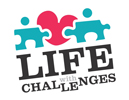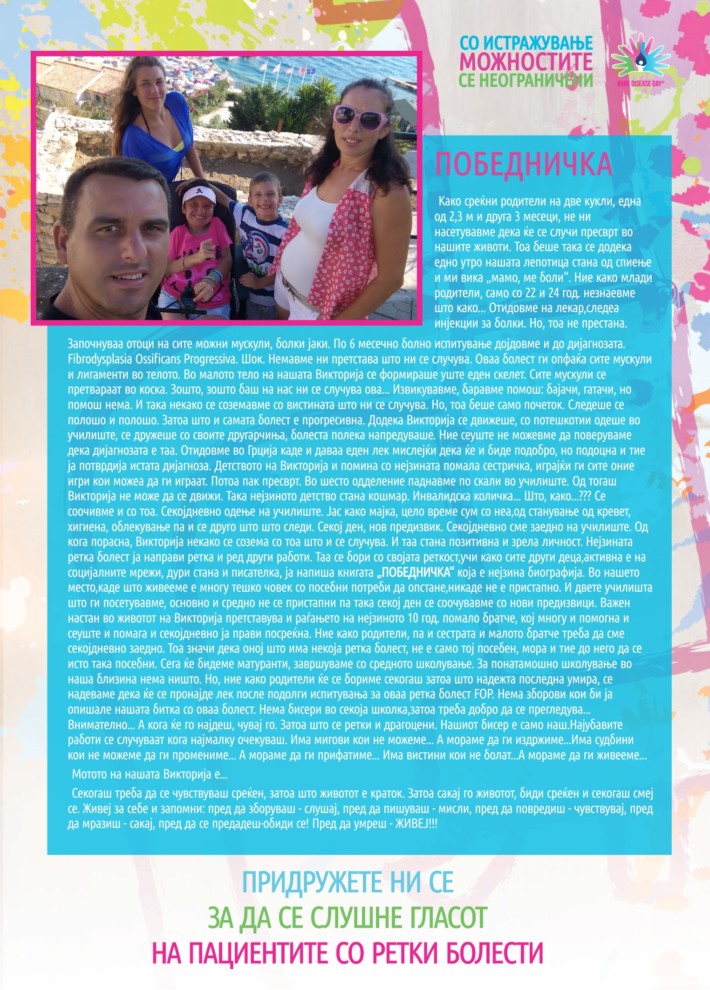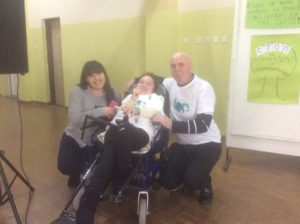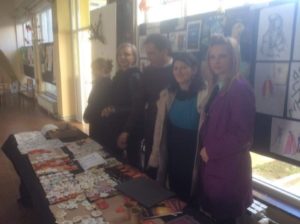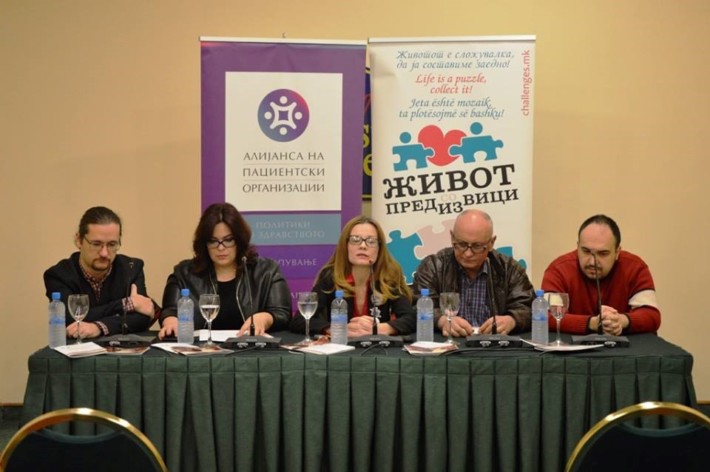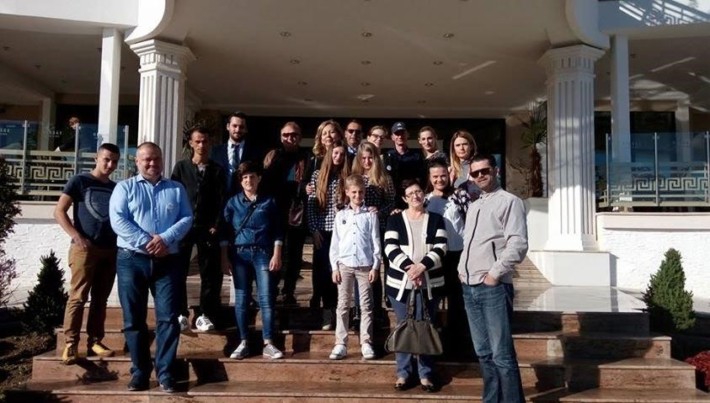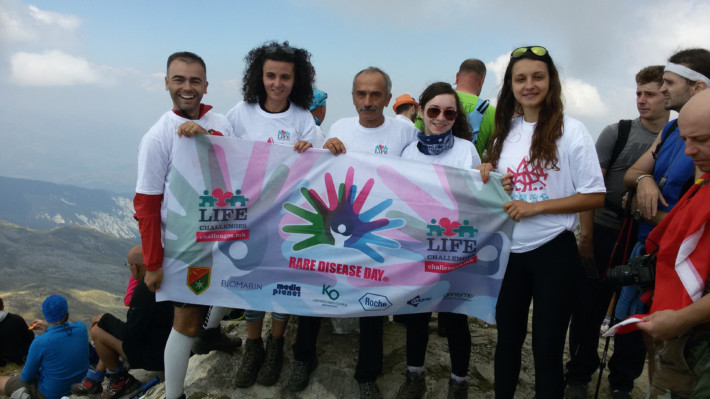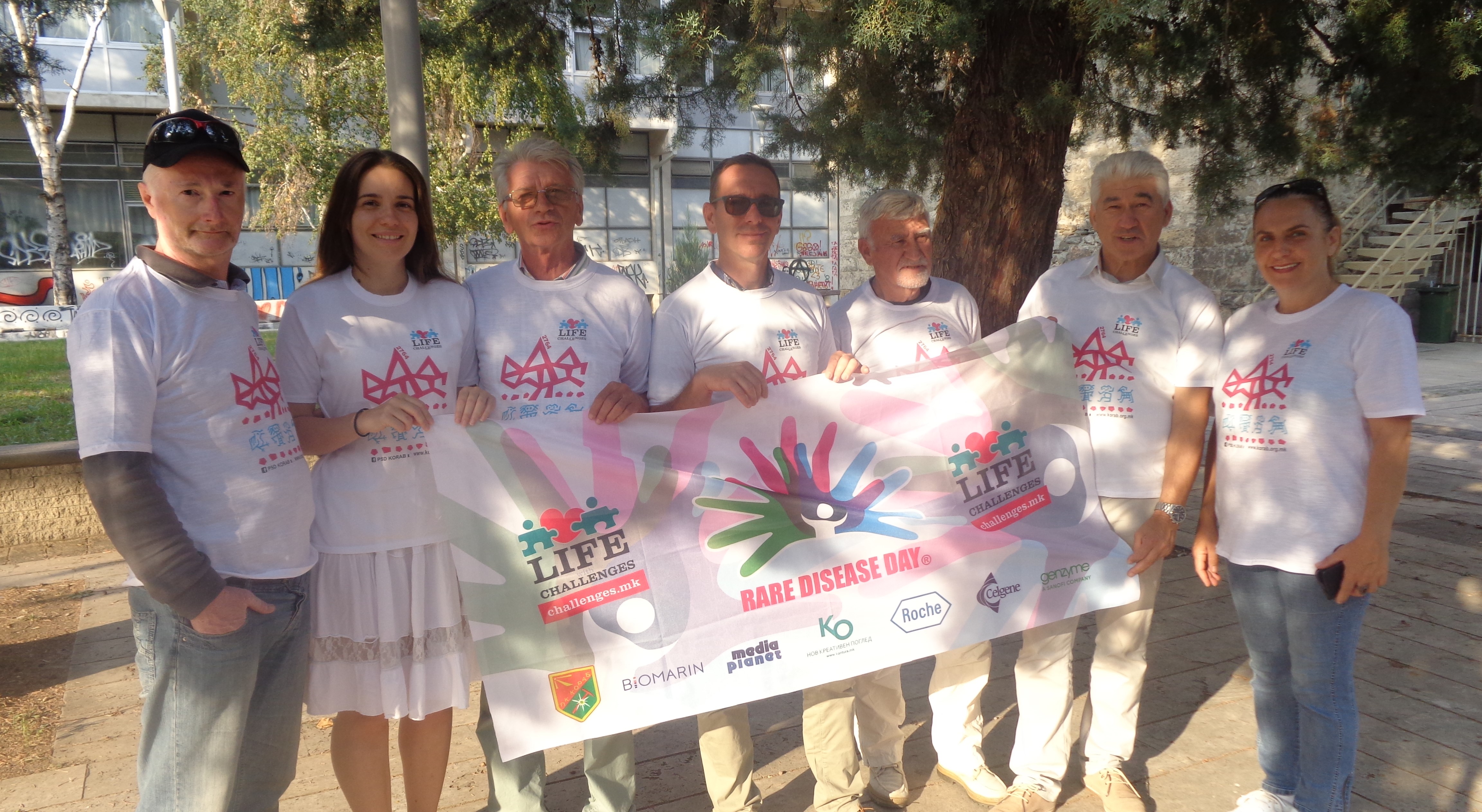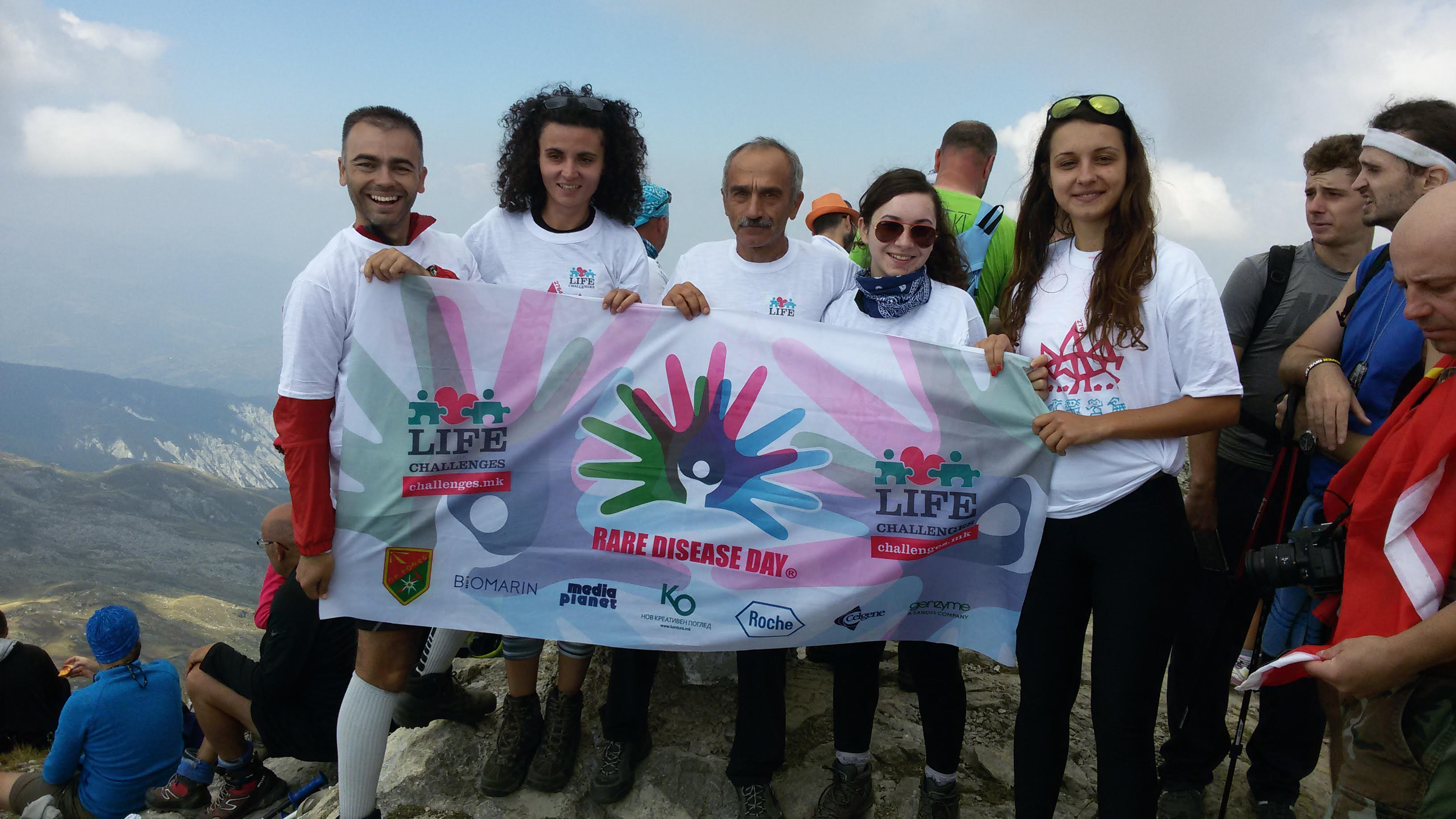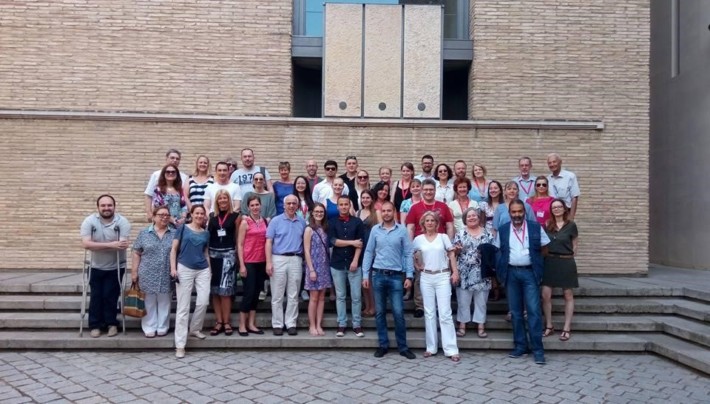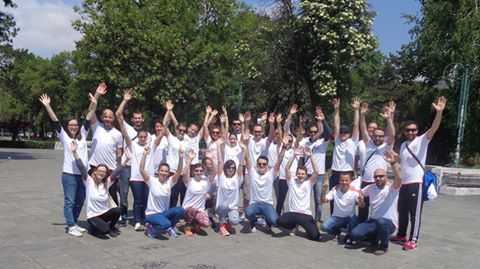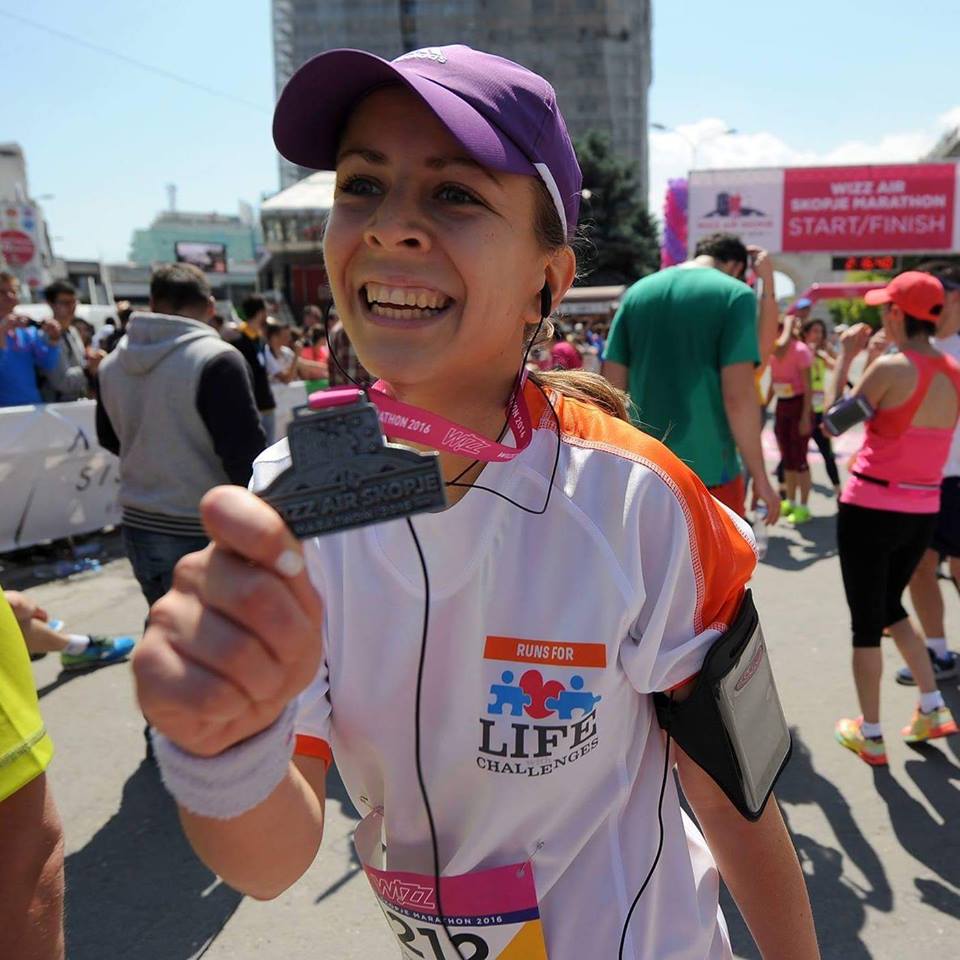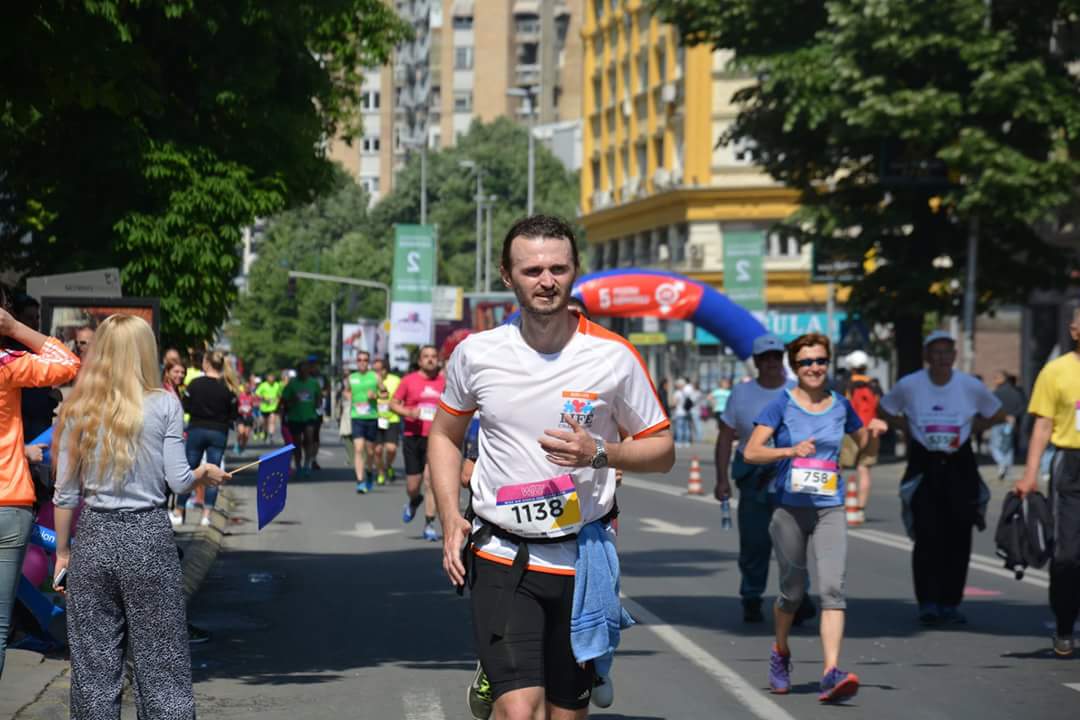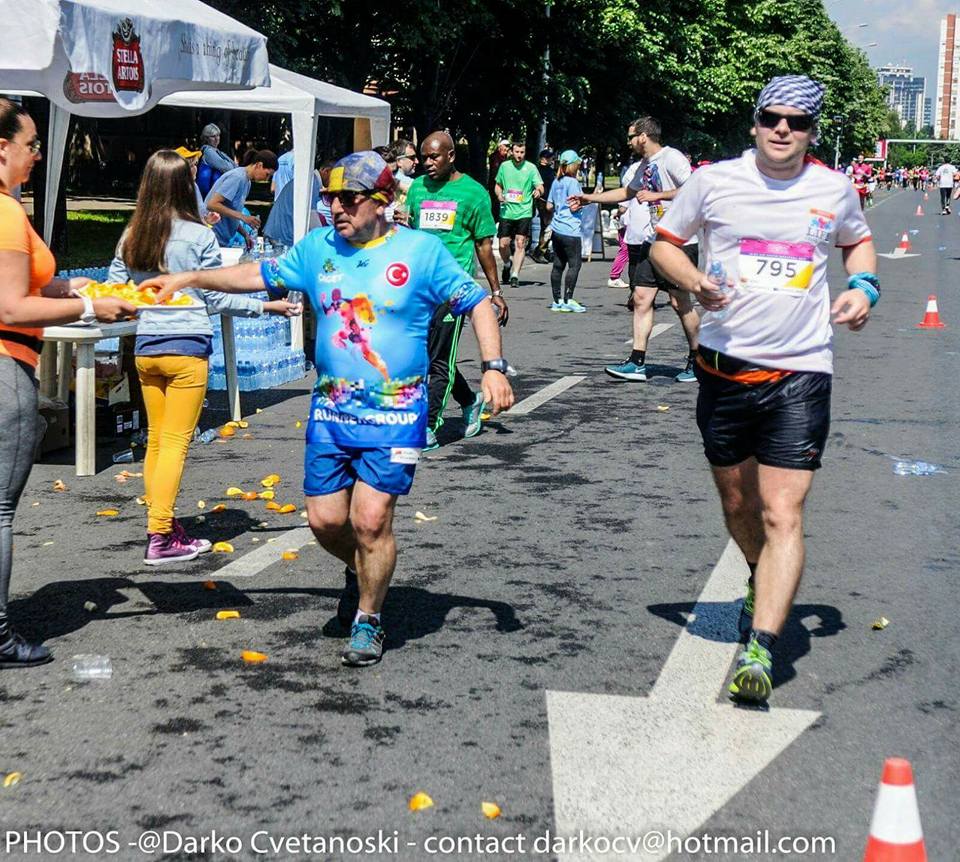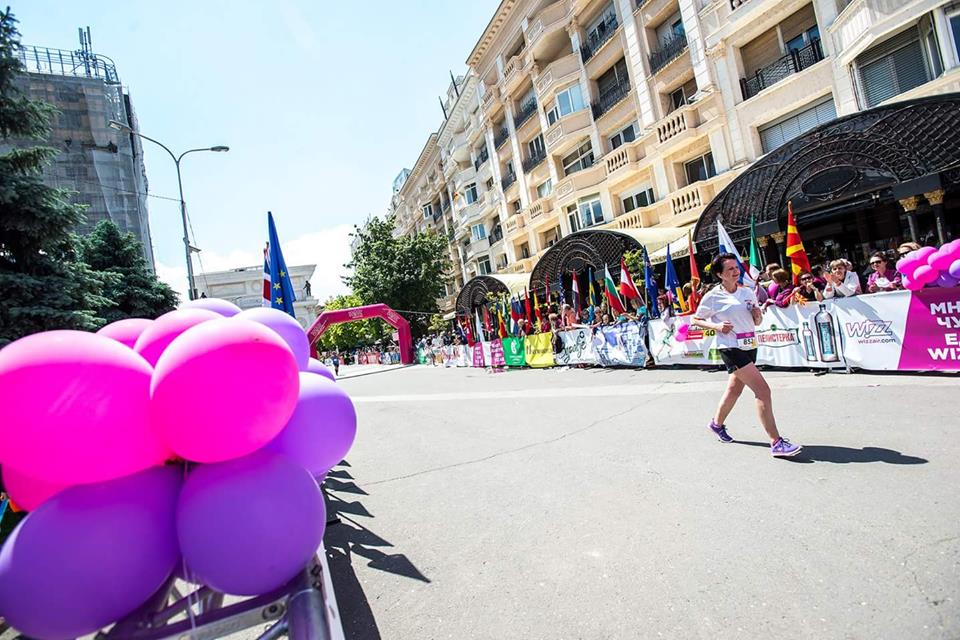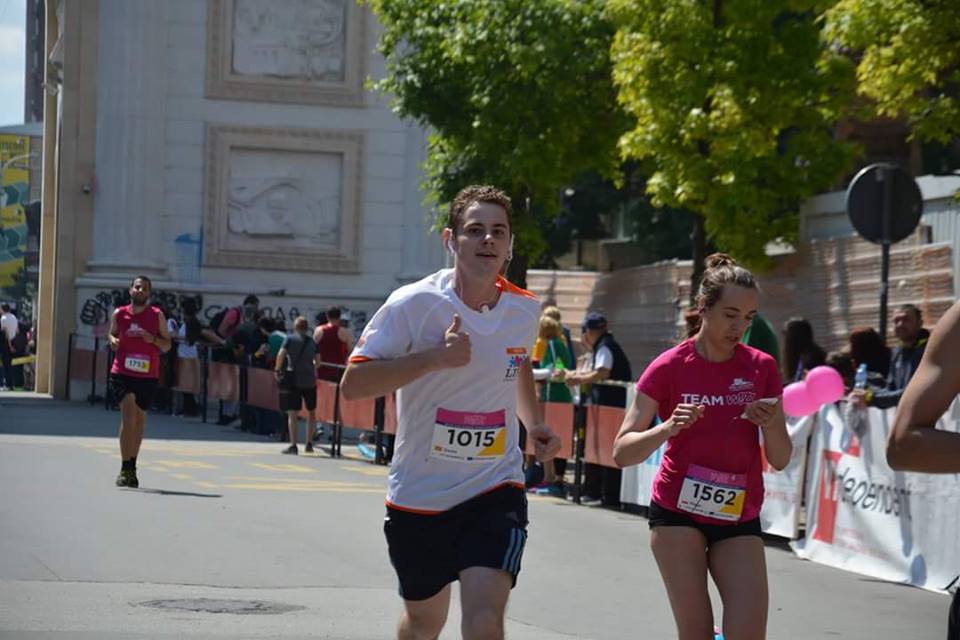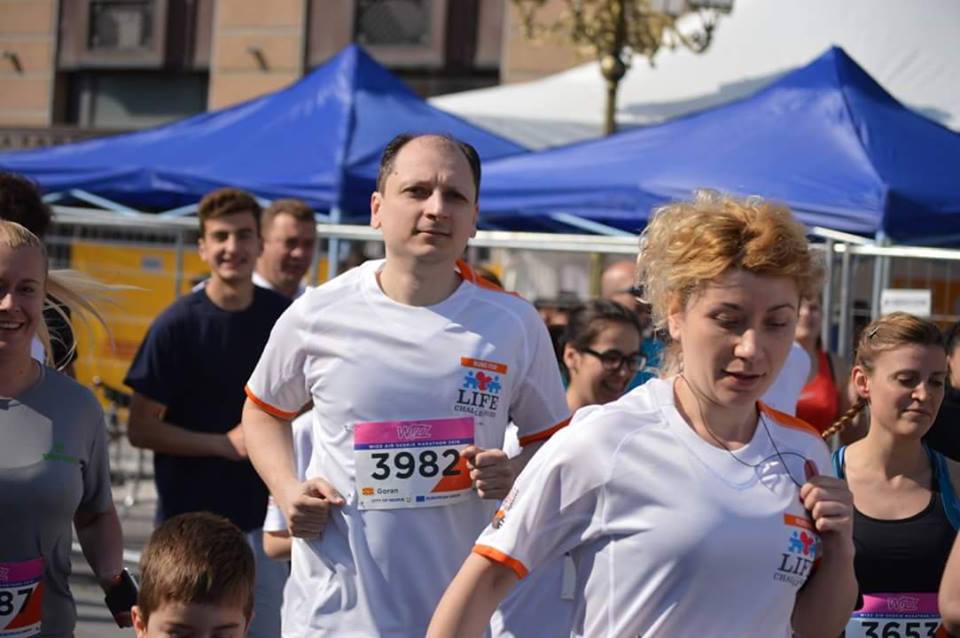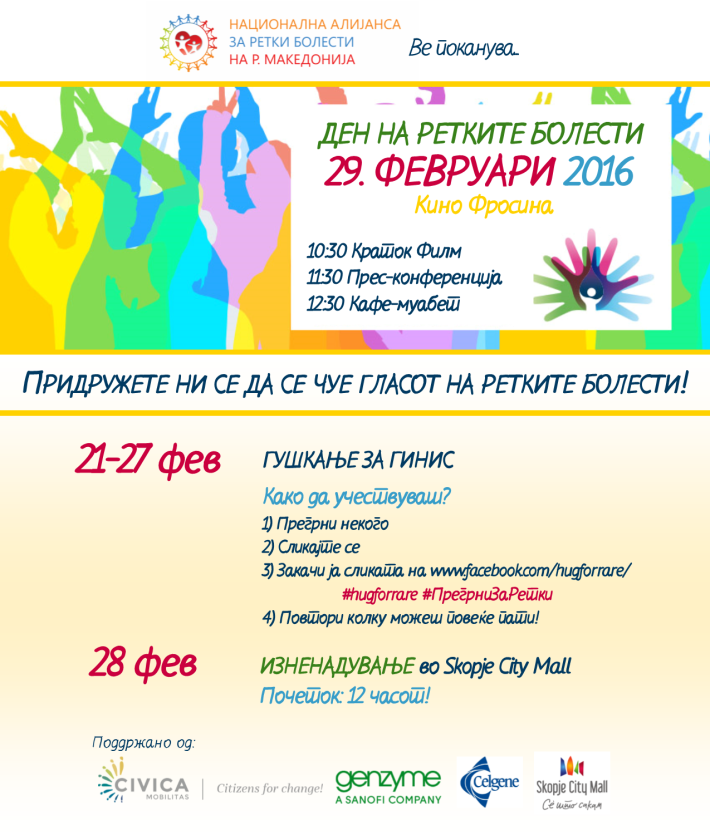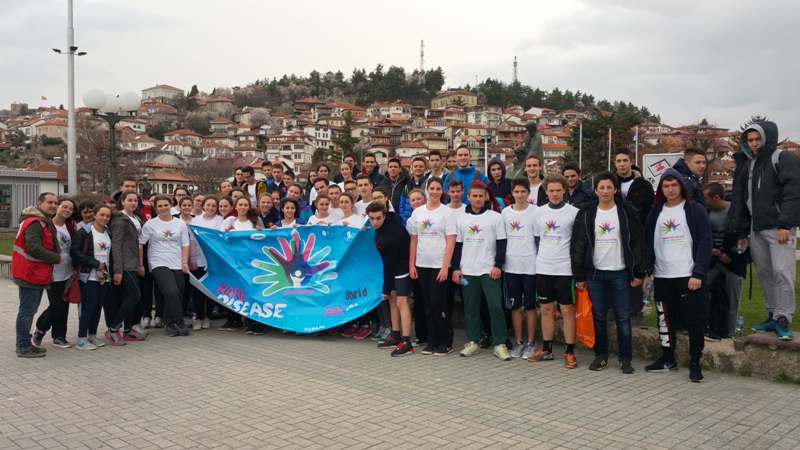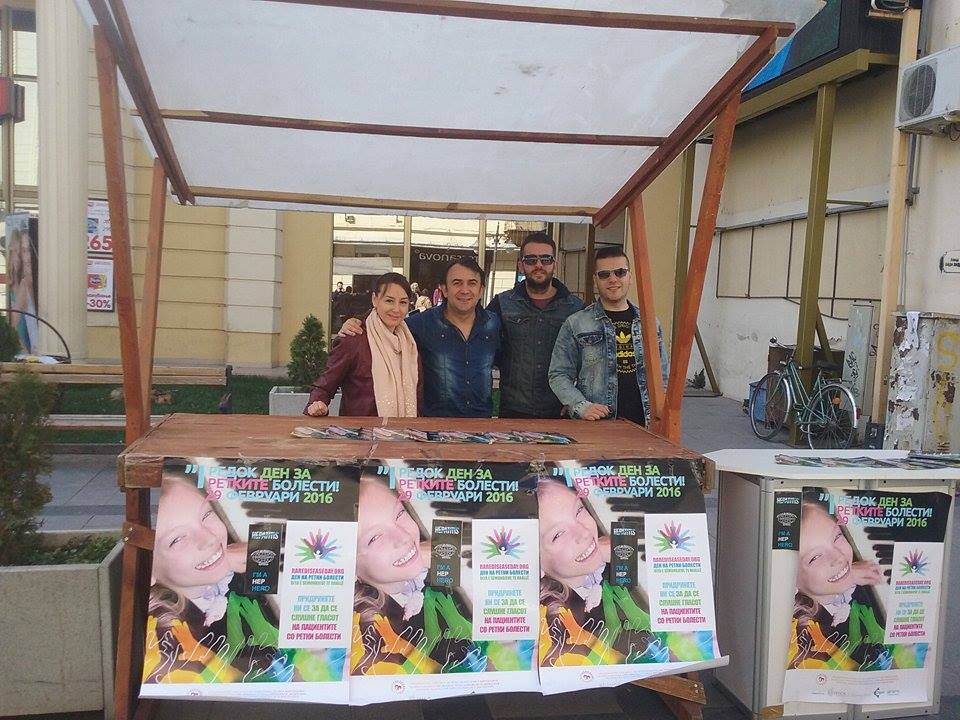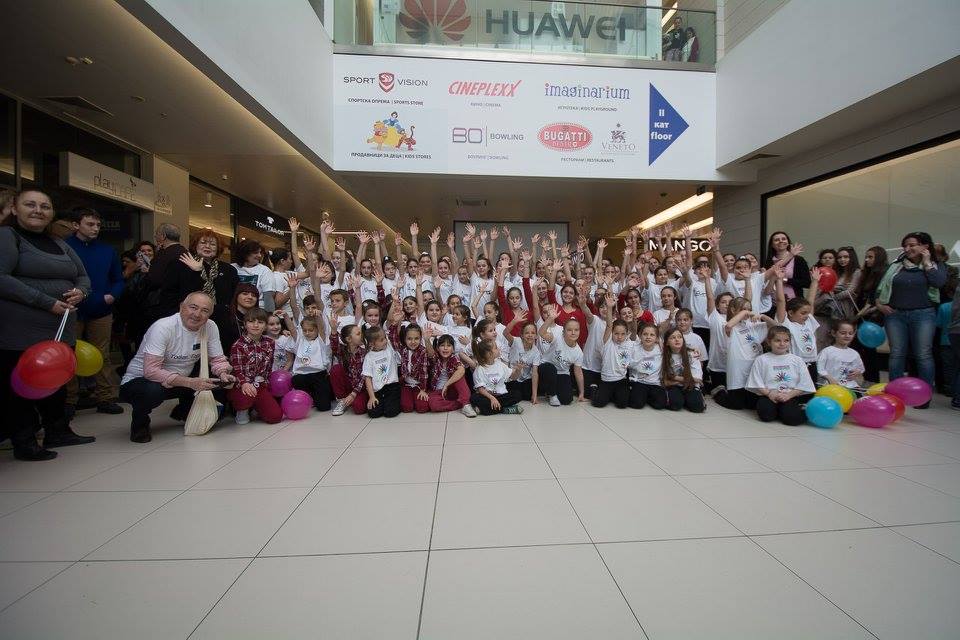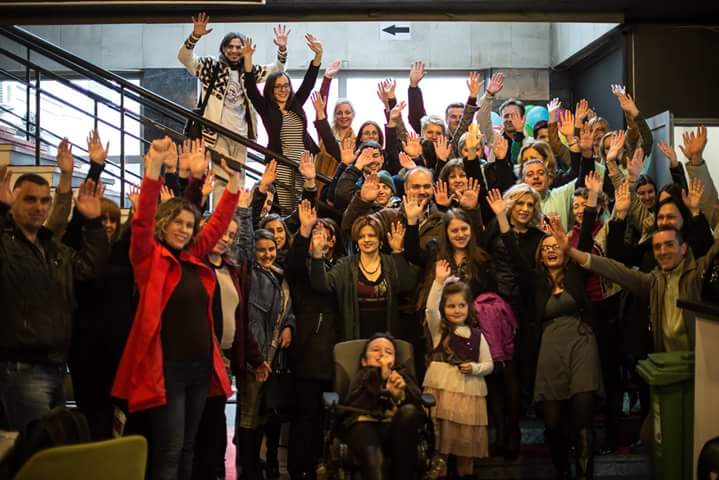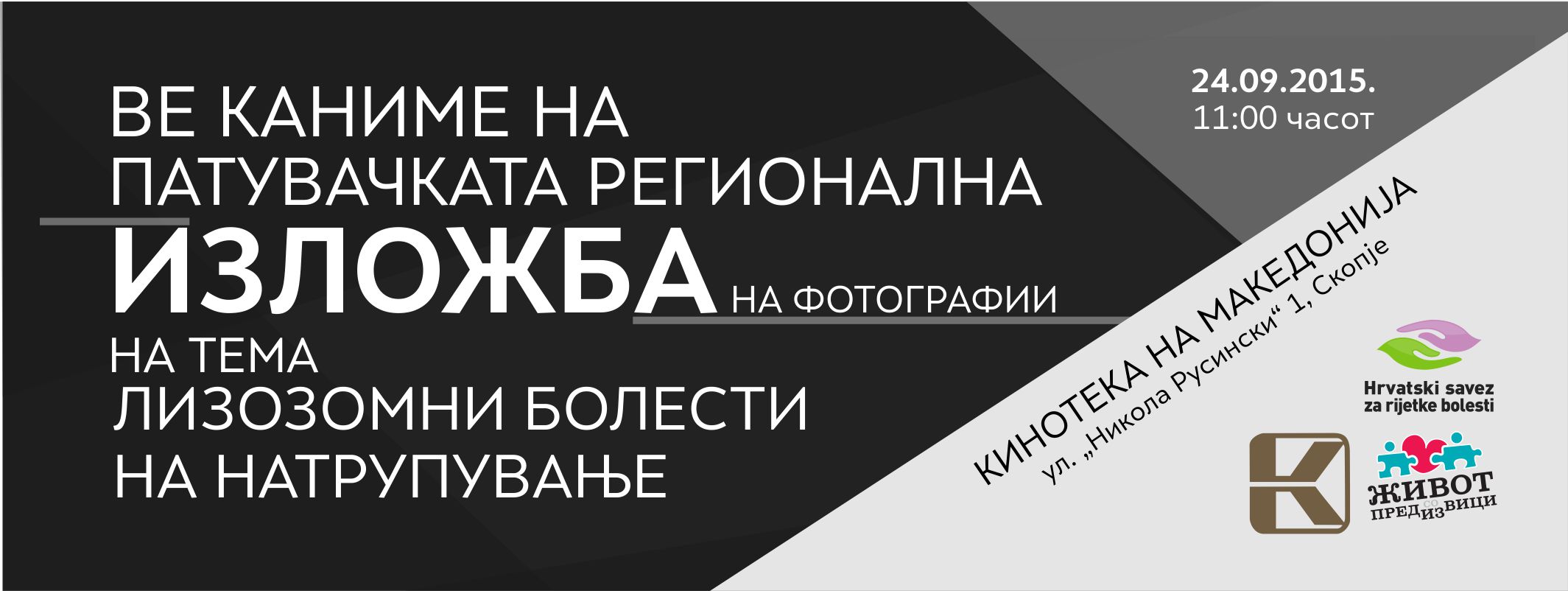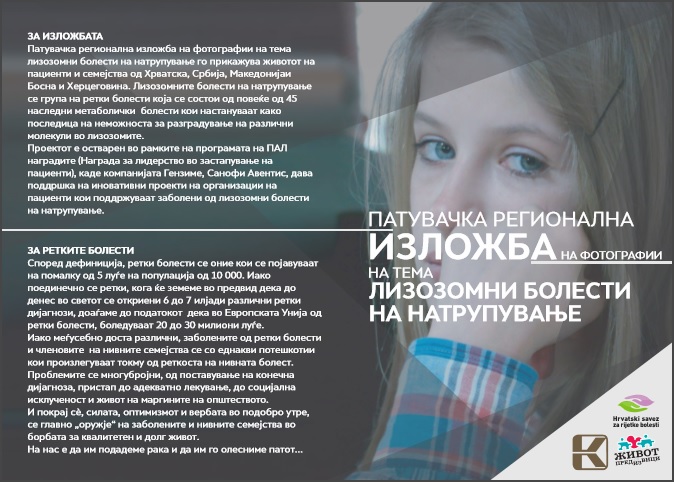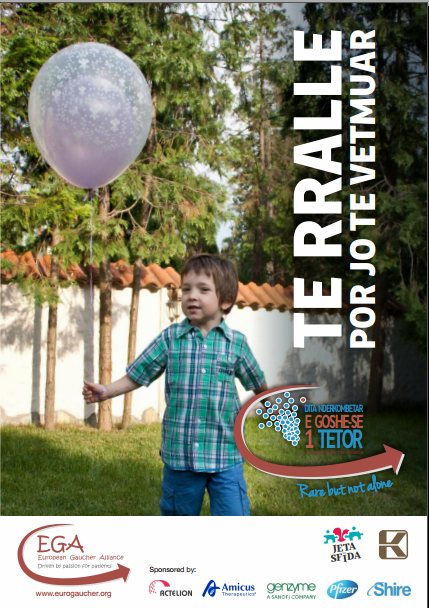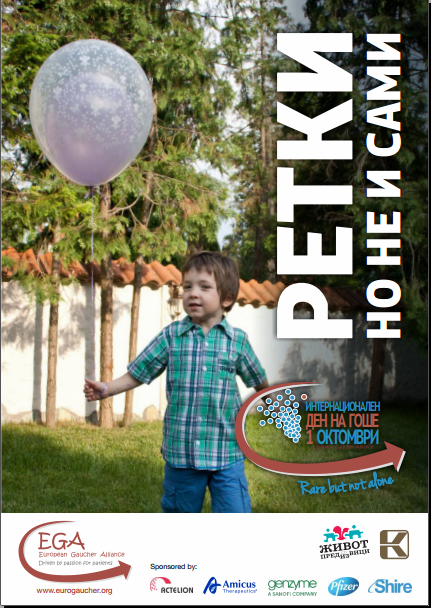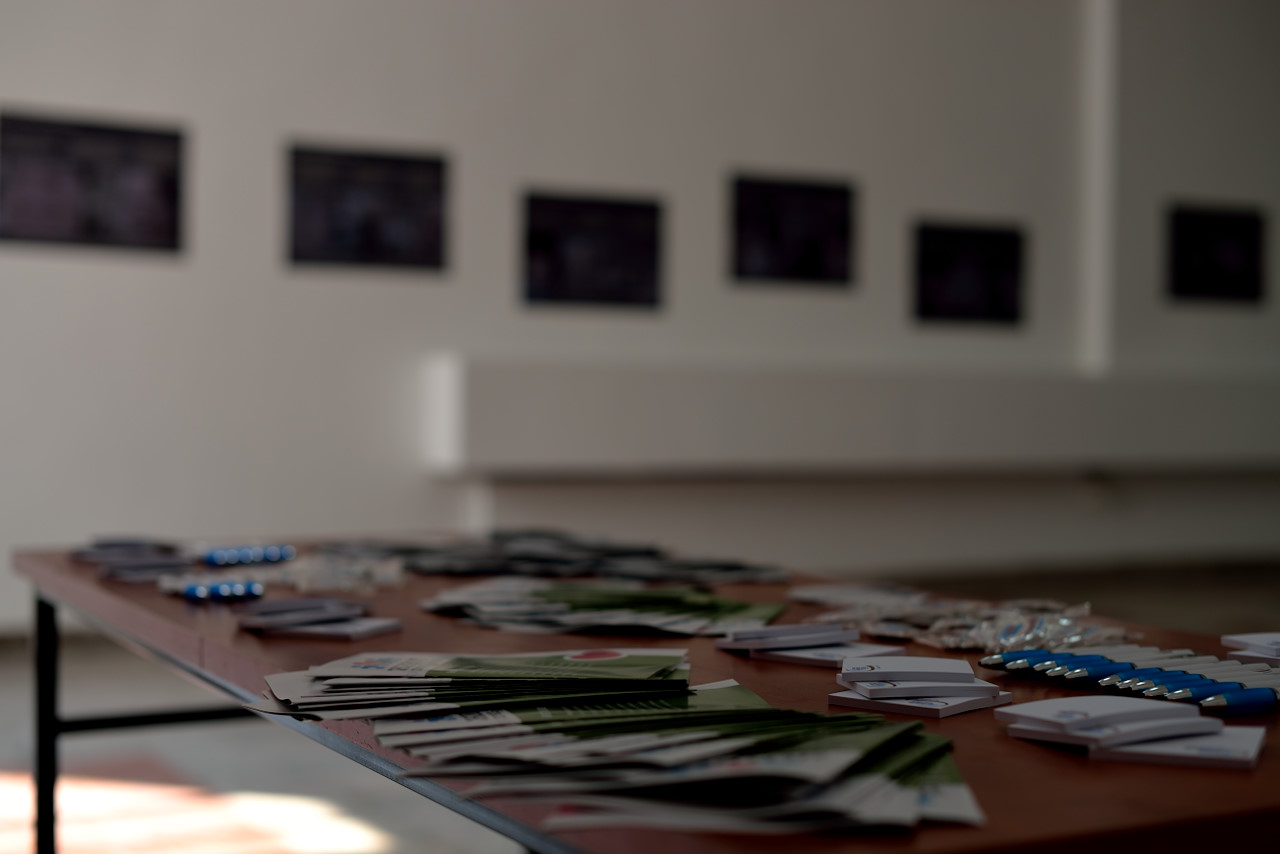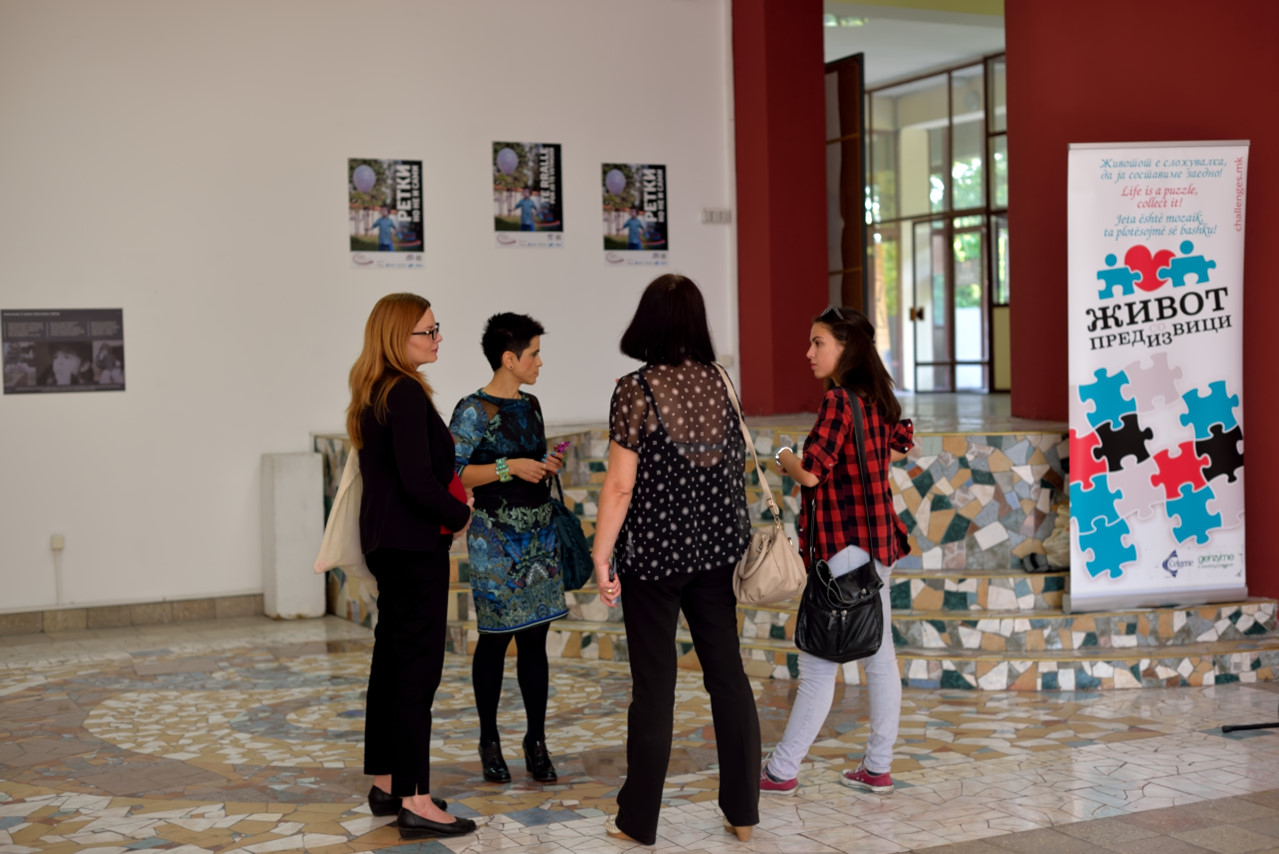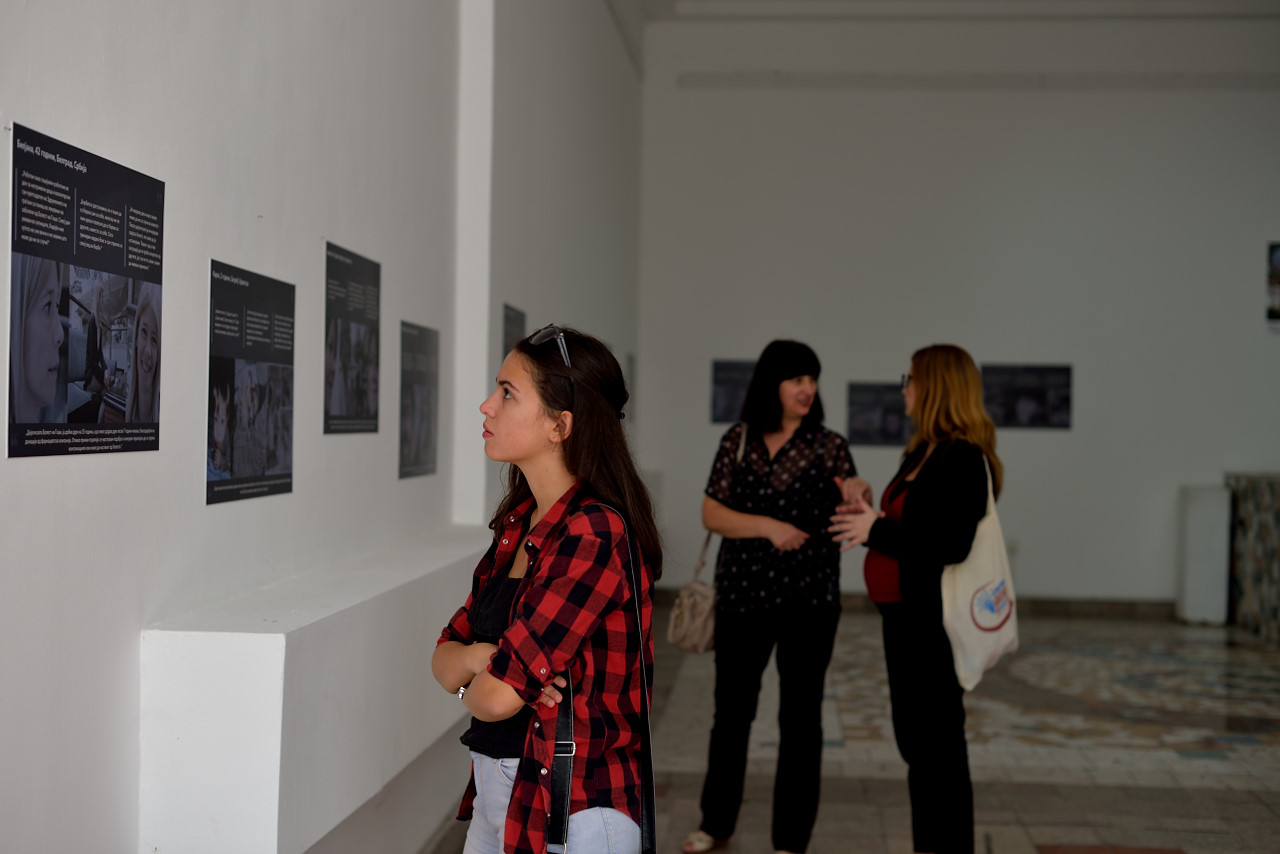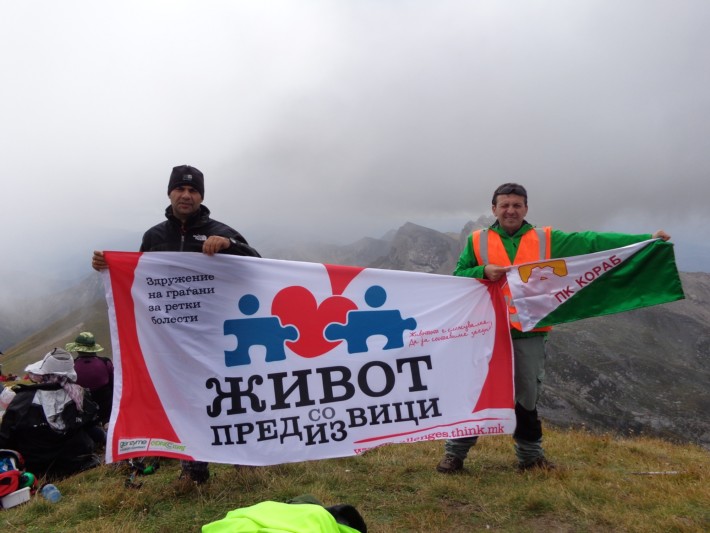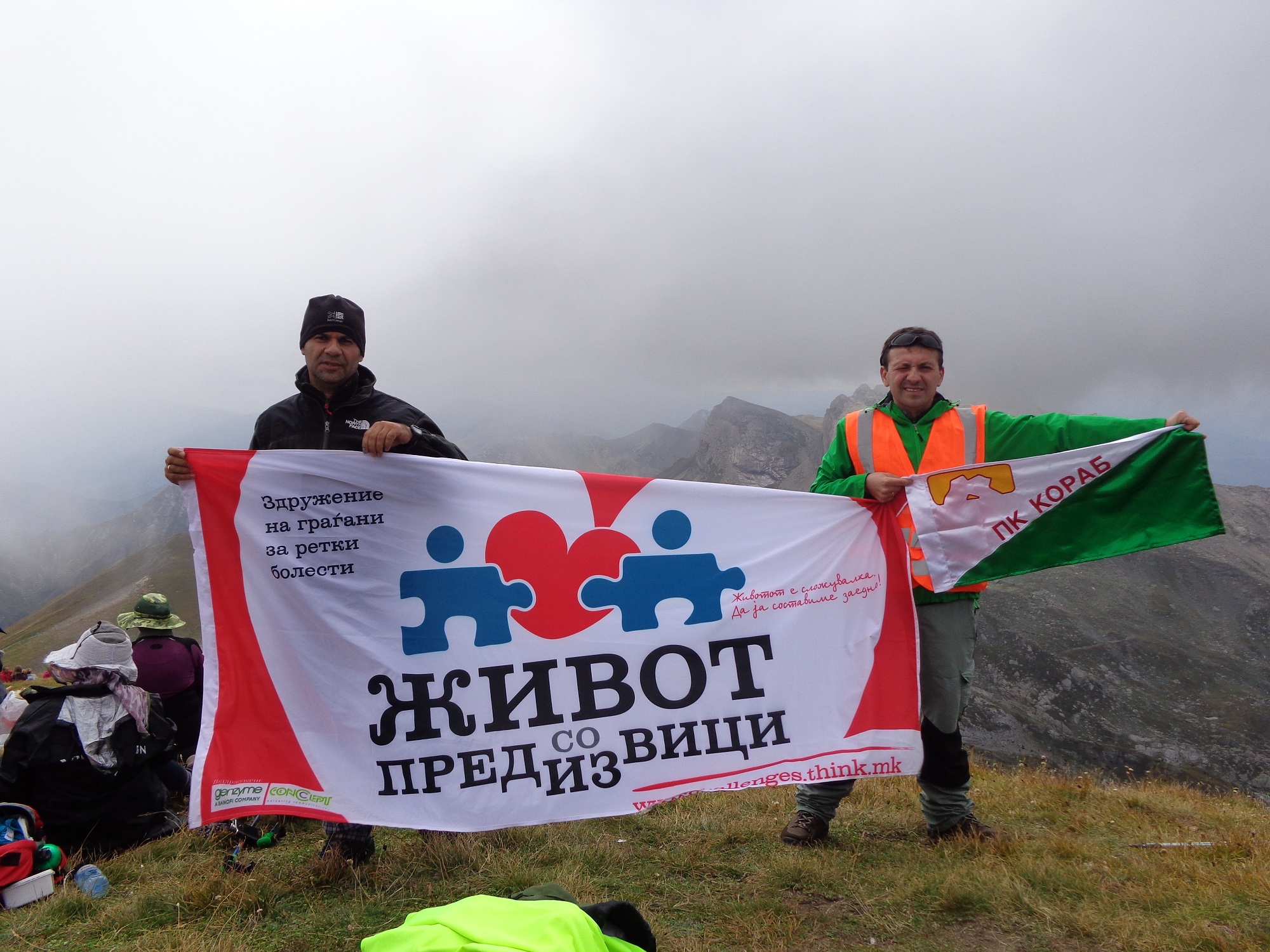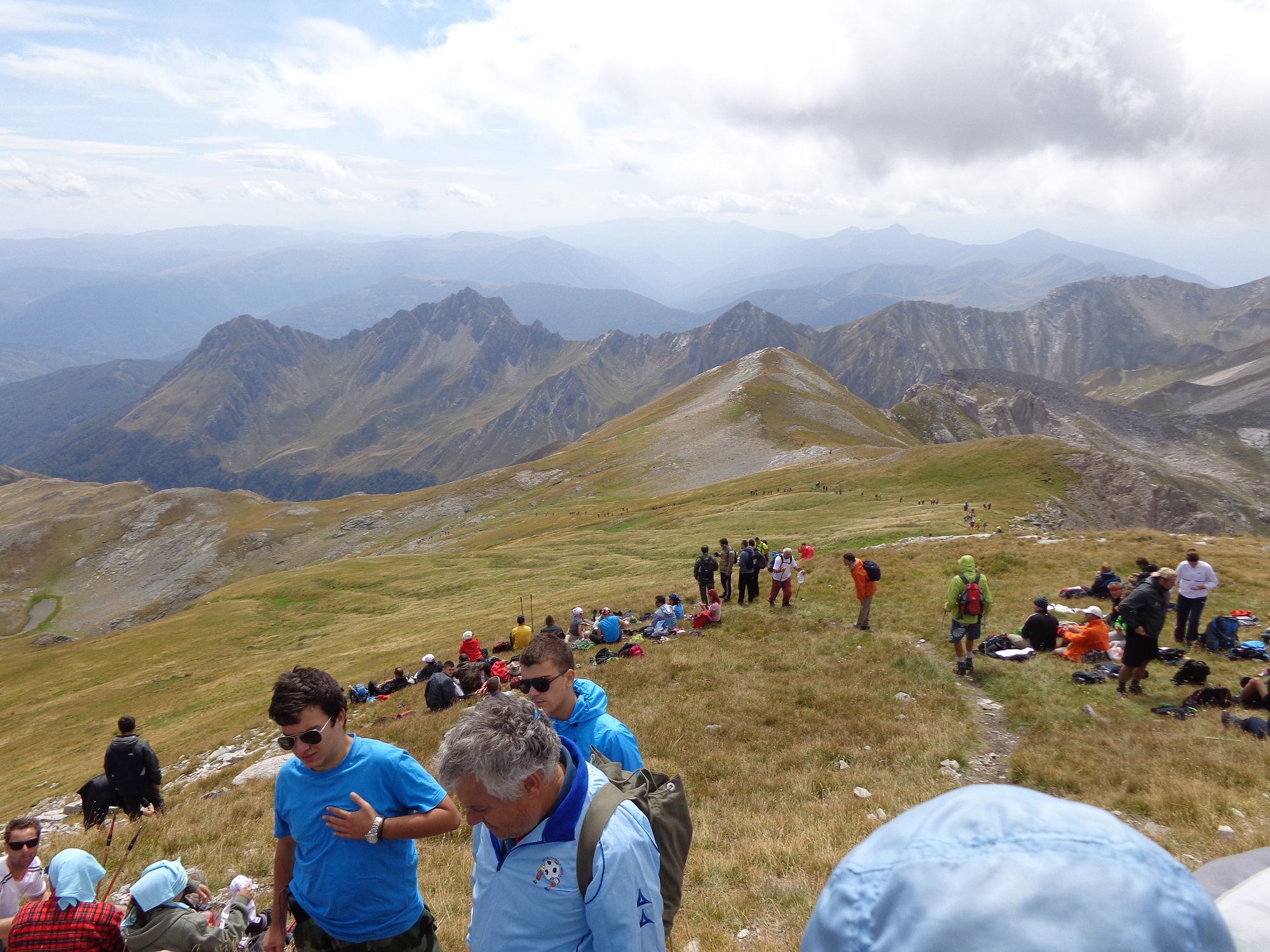On 3rd of December, our member Viktorija Penovska with the help of her school and her friends and family organized an event in her school focusing on the importance on accepting disability and the importance of social inclusion.
The Macedonian Academy for science and art had the opportunity to organize the fifth meeting of SEE for rare diseases, on 12th November, 2016.
Int he organizational committee of this meeting are: Momir Polenakovic, President, Zoran Gucev, Secretary, Nada Pop-Jordanova, Ilija Filipche, Zivko Popov, Velibor Tasic,Aspazija Sofijanova, Vesna Aleksovska, Dijana Plaseska Karanfilska
The program was as it follows:
09.15-09.30 Stefan Chichevaliev, Vesna Aleksovska, Skopje Macedonia, Policies, practices and their impact on the quality of life of people with rare diseases
09.30–09.50 Momir Polenakovic, Skopje, Macedonia, Rare genetic kidney diseases
09.50-10.15 Milosevic Danko, Zagreb, Croatia, Atypical hemolytic-uremic syndrome (aHUS) in Croatian children
10.15-10.40 Zoltan Prohaszka, Hungary, Overview of complement deficiencies
10.40-11.10 Milan Lakocevic, Belgrade, Serbia, Enzyme Repleacement treatment: Serbian experience with taliglucerase alfa
11.10-11.40 Adrijan Sarajlija, Belgrade, Serbia, Glycogen storage diseases – single center experience
11.55-12.20 Johannes A. Mayr, Salzburg, Austria, Mitochondrial diseases – Are they rare or common?
12.20-12.45 Velibor Tasic, Skopje, Macedonia, Pitt Hopkins syndrome an update
12.45-13.10 Zoran Gucev, Skopje, Macedonia, The spectrum of growth disorders: the Macedonian part
13.10-13.35 Rossella Parini, Milan, Italy, Mucopolisacharidosis: diagnosis and treatments
Session II – Moderators: Ilija Filipce, Velibor Tasic, Zivko Popov
14.10-14.40 Hans Joachim Seitz, Hamburg, Germany, Endocrine Disruption as cause of (rare) diseases
14.40-15.10 Oliver Bartsch, Mainz, Germany, Next generation sequencing in pediatrics (in Germany)
15.10-15.35 Jan Halbritter, Leipzig, Germany, Mutation analysis in kidney stone disease
15.50-16.05 Zlate Stojanovski, Skopje, Macedonia, Polycythemia rubra vera in patient with Gaucher disease
16.05-16.25 Liljana Saranac, Nish, Serbia, Microprolactinoma in childhood and adolescence; a rare or underestimated disease
16.25-16.45 Zoran Gucev Skopje, Macedonia, M.Gaucher: treatment
The Citizen Association for Rare Diseases “Life with Challenges” organized a round table on the topic of rare cancers in Macedonia at Best Western Hotel in Skopje on October, 28th , 2016. This activity was about raising the institutional and public awareness regarding the inaccessibility to treatment for patients suffering from rare forms of cancer for which at the moment no therapy is procured neither through the FHIM nor through the rare disease programme of the Ministry of Health nor through the oncology and haematology clinics.
One of these rare cancers is the Myelodysplastic Syndrome and the day of MDS is marked in the month of October. One MDS patient is already receiving treatment through donation and another one received a similar donation in order to stabilize the state before starting bone marrow transplantation. There are different types of MDS and they fall into the rare disease group and there are the so called orphan drugs for their treatment. Unfortunately, at the moment we do not have precise information about the number of patients in need of treatment because of the different classification of MDS, however, the probability is that around ten patients need innovative therapy which will suppress the disease progress and improve patients’ lives.
Also there are many other different types of rare cancers such as: multiple myeloma, malign myeloma, gastrointestinal stromal tumors, gastroenteropancreatic neuroendocrine tumors, acute myeloma leukemia, angiosarcoma, neuroblastoma and many others; some of these have been publicized as rare in the Rare Disease Programme back in 2009, yet today they are not included in the Rare Disease Programme. We believe that they should not be discriminated as such and that these patients should receive the necessary treatment as they in fact do so in our neighbouring countries such as: Bulgaria, Croatia, Slovenia, Montenegro and Serbia made progress in this area.
Statement Vesna Aleksovska, President of “Life with Challenges”
“Rare diseases were invisible for a very long time in Macedonia. Since 2015 and the commencement of the Rare Disease Registry and the increased finances in the Rare Disease programme finally offer 13 diagnosis, that is 150 patients have received treatment. Until then these patients did not receive any type of medication and were left to their own means. Unfortunately, the patients with rare forms of cancer who are at the haematology clinic and oncology clinic still do not receive the necessary medicines. As a patients’ association we believe that there is discrimination towards these patients because they are faced with a rare disease and should be provided with medicines that will prolong their life, as well as improve their quality of life. One of these rare cancers is myelodysplastic syndrome (MDS) which is marked in October and for which we have created a brochure aimed at patients facing with this disease. One patient from Macedonia with MDS already receives the necessary treatment through a donation. We believe that treatment should be provided for all patients with rare cancers who are registered at the clinics. Unfortunately we do not have the exact number at the moment, but such diagnosis are rare and can be found at the Orphanet list; and at the moment this is one of the criteria for procurement of medicines for rare diseases. The criteria of 20 patients per diagnosis is discriminatory and as an Association and Alliance for rare diseases we reacted to the number 20 because we fear that the number is very limiting and there is uncertainty what will happen when the 21st patient is registered. We appeal for the rare disease programme to additionally expand financially, that is to say, for the amount that had been promised at the beginning (twice more than the present amount of 3 million euros) so that more patients receive the necessary medicines. Innovative medicines used in the world should be used in Macedonia in order to prolong and improve the patients’ lives.
Statement by patient with MDS –Dragi Lazevski
“In September I felt as if without energy or fitness, after all the tests the diagnosis of megaloblastic anaemia was confirmed in November. I was in dire financial situation and unable to provide the necessary medicines. Fortunately through Doctor Irina from haematology, whom I am deeply grateful for all her endeavours and those of the nurses and staff at the haematology clinic, I received treatment through donation from the company Celgene. After the treatment I felt wonderful and I can work and spend time with my family and do everything that I did before the disease. I must say that is important that innovative therapy should be available to al patients in order to have good quality of life and to prolong their life. No family alone can afford to provide treatment. Financially it is terribly difficult.”
Statement – Biba Dodeva, President APO
“In this pre-election times citizens need more than slogans. Therefore I publicly call upon all public institutions, present and future government, present and future health managers, I call upon the politicians and all those which our health depends on to put cancer as a priority in the health programmes and to understand the necessity of URGENT implementation of the National Strategy for Controlling Cancer in Macedonia that will enable and engender joint detection of problems and a comprehensive approach for surpassing them and resolving them.
Statement- Davor Duboka, Executive Director of the National Rare Diseases Organisation of Serbia
“I would like to point out the importance of what has been happening in Serbia recently, namely the HIF is already in negotiations with the pharmaceutical companies to create a priority list of innovative medicines that will be procured through a special fund in order to help patients facing difficult diseases, not only rare disease, but also cancer and other diseases requiring innovative therapies. In Serbia all the associations have come together in our demands for innovative medicines and we have finally reached and understanding from the institutions for the needs of the patients. For the time being 20 new medicines will be procured through the list of priority innovative medicines.”
Statement – Borislav Gjuric, President of the Rare Disease Association in Bosni and Herzegovina
“Bosnia and Herzegovina are unfortunately in a bad political situation because of all the problems we were facing in the past and have been facing ever since. The separation into cantons is very complicated and in some regions the situation with medicines is very good while in others it is devastating. Macedonia has a simpler political system and it is really incomprehensible why there is not a solution for the cancer patients yet. Personally I think it is literally manslaughter not to provide medicines for a patient whose life could be spared. It is not manslaughter just to kill someone. Health is a basic human right and no citizen should be deprived of it. All countries in the region make efforts to improve the quality of life of patients; we collaborate with all the associations and support regionally each other and we will not give up from the basic human right of life – health. We cooperate with institutions and media as well… one by one we might be few, but together we are many and together our voice is stronger and reaches further.”
To mark the International Gaucher Day, the Macedonian association for rare diseases LIFE WITH CHALLENGES together with the Albanian association organized a meeting on 8-9 October in Struga, Macedonia. At the meeting we had families, patients, doctors and nurses connected to Gaucher disease type 1,2 and 3. Also we had representatives from Genzyme and Pfizer who sponsored this meeting.
Patients talked about their challenges and problems regarding therapy and they shared experiences about what is going on in their countries at the moment, how they were diagnosed, what kind of therapy do they receive, and what kind of tests do they do … they talked about home treatment and will it be a good option to have in future. We have the possibility to also hear a story from a patient who was on a clinical trial on Cerdelga and now he is still on the pill, which was a new experience for all patients. We truly hope for a future where patients together with doctors can choose therapy that is most suitable for the patient and with most quality of life for the patient and the family.
Doctors from both countries (Dr Biljana Coneska Jovanova) had presentations about what is Gaucher disease, and about the patients in the countries (treatment, challenges, future options).
We realized that we face some same and some different problems and that we can help each other to do more for the patients.
The support from EGA is very important, because of EGA we manage to came together and talk, and now there is an association of patients in Albania that will soon join EGA. We agreed that the most important thing in future that we expect from EGA in this region is education of doctors about diagnosis and treatment. We hope to have the next meeting in Albania in spring time and to have guest lecturers – doctors from EU.
The Citizens’ Association for Rare Diseases Life with Challenges continues the tradition to participate in climbing Macedonia’s highest mountain top Golem Korab in 2016.
On the occasion of 8th of September the traditional climbing of Golem Korab takes place on the 4th of September, Sunday. ZPK Korab pitched the flag of the Citizens’ Association for Rare Diseases Life with Challenges on the mountain top.
Statement by Vesna Aleksovska, Chairperson of the Association
We are grateful that the rare disease programme with the Ministry of Health works with a greater budget and encompasses a larger number of diseases, that is to say, more medicines are procured for rare diseases and they literally save families. I sincerely thank the team within the Ministry of Health, especially Rashela Mizrahi who heads the programme with great dedication and understanding of our challenges. A lot of people are responsible for the advancement in the field of rare diseased in Macedonia, firstly the patients and parents who courageously demand their rights from the media and the institutons. They have received selfless support from the doctors headed by Aspazija Sofijanova, MD, as the chairperson of the Committee for Rare Diseases.
We still face various challenges that we hope will be resolved in cooperation with the institutions. Firstly, it is very important that the tender procedures are realized swiftly and efficiently and patients should not be left to wait 3 to 6 months without treatment as was the case this year. We have understanding for administrative procedures and in return we demand understanding for the needs of patients. No one should be left waiting for something that means life for that person.
Furthermore there is the need to clearly establish how new patients will be registered as well as how new medicines will be introduced in the list in the programme in order to avoid confusion and wandering from one institution to another and again long waiting periods for the patients. These diseases are lifelong, chronical and there is the necessity of an urgent intervention so as to avoid long-term consequences to health and quality of life. Accordingly, if a condition requires combined treatment it should be timely procured and should the patient become resistant to the first-line therapy to provide second or third-line therapy if such therapy exists.
We appeal that it is of utmost importance to provide treatment for patients with rare cancers who do not receive any treatment whatsoever at the moment neither through the MHIF, nor through the cancer programme, nor through the rare disease programme. These cancers are very few and the number of patients is very low and it is necessary to act swiftly to resolve the issue with these patients. Their families suffer quietly looking for hope through donations and alternative treatments.
In case where there is no treatment available and there is a need of orthopedic devices they should also be provided through the MHIF and the reimbursement should be alleviated with a statement which would be issued twice a year and not each month. Some disabled patients have the need of a personal assistant and assistance after the age of 26 and we appeal for this to the Ministry of Labour and Social Policy. All institutions should work together to resolve all the issues and challenges which the families with rare diseases are faced with.
Where necessary patients should be provided with the opportunity to receive treatment at home or in a hospital in the cities where they live in order to lower the costs of both patients and clinics as well as the time necessary to access treatment.
Finally I have to point out the importance of carrying out the procurement through suitable distributive channels so that to avoid problems with the quality of medicines, that is to say, to have additional requirements when there is a case of parallel import of medicines where a certificate of quality and origin shall be requested. This should be so in order to avoid additional patient suffering as was the case with the patients with Gaucher who were left without treatment for 6 months and for which there is still no reply from the Agency of Medicines which withdrew the medicines in order to investigate their quality after a strong allergic reaction with a child suffering from Gaucher.
This activity is carried out in order to raise the public awareness regarding the rare diseases in Macedonia and the challenges the people with rare diseases and their families face daily. For this activity we are grateful to ZPK Korab and its chairperson Ljubomir Kotevski who accepted the idea wholeheartedly from the very beginning.
We are grateful to all those who have supported us so far and we continue the cooperation. We hope to make our contribution as an association to the future for the people with rare disease and to create a future that they desire.
The EGA is delighted to announce that during its Biennial General Meeting in Zaragoza on 29 June, its members expressed their wish to amend the founding constitution by abolishing the differentiation between full and associate membership. With a voting result of 69% in favour of providing full rights to non-European member associations, the majority of the members expressed their clear wish that the EGA becomes a global group.
On 29 June, Pascal Niemeyer was elected by the new board of the European Gaucher Alliance as chairman. Pascal has been working on the board since 2008 and is responsible for the areas of public relations and liaison with the EWGGD. Pascal takes over from Jeremy Manuel, who decided to step down as chairman to make way for the next generation, whilst assuring his dedication to continue to support the Gaucher community by agreeing to remain on the board.
The entire board would like to thank Jeremy for his tireless engagement in building and developing the EGA for more than 20 years.
The new board was formally announced as: Vesna Aleksovska (Macedonia), Biljana Jovanovic (Serbia), Anne-Grethe Lauridsen (Denmark), Jeremy Manuel (UK); Pascal Niemeyer, Chair (Germany), Johanna Parkkinen (Finland), Jasenka Wagner (Croatia), Sandra Zariņa (Latvia), Irena Žnidar (Slovenia).
Some very interesting discussions took place during the biennial meeting. Workshops where participants were split into four groups facilitated by board members. To inspire the discussion a short introduction was given on possible subjects to discuss, based on the information given in your Country Reports which were sent in ahead of the meeting.
The board has now evaluated all the written feedback from each groups and split the issues raised into the following 3 areas:
• How to get a diagnosis, switching treatment, treatment or no treatment, social aspects of GD
• Running an association; why and how
• Creating awareness towards different target groups
Looking deeper into the feedback, the overall theme identified was “Awareness” and so it was decided that a small group within the board should look at what this means on different levels. Based on this work the group will identify possible new projects to propose to the full board at the next meeting in January.
The association of citizens for rare diseases LIFE WITH CHALLENGES continues with the tradition to participate on Skopje Marathon. This year the association Moment Plus from Gevgelija is also participating in the marathon.
On 8th of May, 2016, 60 participants from Skopje Night Running will run for Life With Challenges on 21 and 42 kilometers, and also there will be additional participants running for Moment Plus on 5 kilometers. The voice of rare diseases is stronger when we are together.
This activity is for raising public awareness about rare diseases in Macedonia, emphasizing the challenges that people with rare diseases and their families face in every day life. We are thankful to all that support us until today and we will continue with the cooperation further. We hope to contribute for a better future for people with rare diseases as an association. .
Statement – Vesna Aleksovska, President of Life With Challenges
„Rare diseases are complex and to resolve the problems and the challenges that people with rare diseases face every day we all need to work together: the associations, the patients, the institutions, the health professionals, the pharmaceutical industry, researchers and other stakeholders … only with mutual work and good communication we can provide better quality of life.
With the development of the register for rare diseases and the increase of the financial resources for procurement of medicines in the program for rare diseases, and also financial resources for diagnosis and education, the Ministry of Health made significant steps toward improving life of patients with rare diseases. We will continue with communication with the insitutions and hope to provide other benefits for the patients as procurement of special orthopedic devices and needed social services and care for patients that do not have available medicines at this point. Each patient deserves a chance for better life. Also I have to mention that rare cancers are still not taken care of, and the institutions need to make steps to care for these patients that at this point have no innovative medicines that are used in Europe and in our neighbor Balkan countries. “
Statement – Iskra Dimitar and Tomislav from Skopje Night Running Изјава –
Skopje Night Running as an initiative for raising awareness for recreational running is joining to support the fight for better quality of life for patients with rare diseases. Through our initiative for recreational running we supported different causes and it is our pleasure to give support to Life With Challenges for a second year in a row.
Statement – Gjurgjica Kjaeva, President of Moment Plus – Association for pulmonary Hypertension
„The World Day of Pulmonary Hyperteension is a gloabl campaign from the World association for PH for raising public awareness about his disease. PH is a diseases of the lungs and the heart. The World day of PH is being marked with events in whole Europe on 5th of May.
Breath of Success is a campaign marking positive stories from patients that live with this disease and it is encouraging people to share their hopes and dreams. It is really important to get early diagnosis and early treatment. We hope that in future the patients in Macedonia will have more available medicines and better therapy so that they can have better quality of life.“
The event is realized in cooperation with:
Skopje Night Running, Skopje Marathon
The event was supported from:
Genzyme – SAnofi Aventis, Celgene International, PH Europe
On the occasion of the World Rare Disease Day 2016, the National Alliance of Rare Diseases of Macedonia organized an event to mark the occasion on 29 February (Modnay) in the cinema Frosina- MKC. In the course of the Friday, Saturday and Sunday prior to the 29th , events were as well organized in Ohrid, Prilep, Gevgelija and Bitola by handing out leaflets and activities such as hugging to break the Guinness record in hugging.
Ohrid: The Organisation of the Red Cross in Ohrid together with the Association for cycling, mounteneering and Eco-culture Z’s Avantura, on the 27th under the title HUGGING OF GALICHICA organized a hiking tour on the mountain Galichica. The pupils from the State Secondary School “Sv Kliment Ohridski” marked the rare disease day by running an athletic cross race which took place on the 29.02.2016 at the Ohrid Lake Quay.
Bitola: The association Hepar Centre organized handing out leaflets and hugging on 27.02.2016 (Saturday).
Gevgelija: The association Moment Plus organized hugging and handing out leaflets on 26.02.2016.
Prilep: Volunteers with the support of the Municipality of Prilep organized a fashion show in the cinema Miss Ston on the 27.02. 2016
Statements
The Managing Director of the Agency of Medicines and Medical Devices Ms. Marija Darkovska Serafimovska discussed the importance of ORPHA medicines. Although the rare diseases are few and generally the medicines necessary for them are not interesting for the pharmacological industry because the research they require is expensive and the market is small, lately there has been some positive advance as a result of sponsored research by the governments, shorter administrative procedure and the patent for these medicines lasts longer. In regard to these medicines in Macedonia in 2015 a continuous supply was provided and this was thanks to the amendments in the Law on Excise Tax and the work of the Rare Disease Commission. The Agency for Medicines and Medical Devices will continue to give its support in the same and similar way.
The Chairperson of the Commission for Rare Diseases PhD Aspazija Sofijanova, MD pointed out that living with a rare disease is a challenge; she also stated that it is an even greater challenge to maintain the disease under control. She emphasized that the rare disease registry is regularly updated and that we should all work together on greater integration of the people with rare disease in our society. She said she was grateful to everyone who is part of this struggle, as well as the media for the positive coverage of this issue. Ms. Sofijanova underlined that it is not only therapy that matters but also the family and the integration in society.
The MANU Representative, PhD Dijana Plasheska Karanfilska briefly stated how important is diagnostic and that although it is expensive it exists. Modern diagnostic tools are available to patients in Macedonia and with these tools prenatal and genetic diagnosis can be carried out, which help to determine the possibilities of a rare disease occurring in the family.
The President of the National Alliance of Rare Diseases, Vesna Aleksovska stated “At the beginning, in 2009, I was a lone fighter patient, but today we have a big family where we all fight the battle of Rare Diseases.” She summed up how important treatment was and pointed out the research that Life with Challenges carried out in cooperation with “Studiorum”.
Presentation of the research on rare diseases by Stefan Chichivaliev (Studiorum)
Stefan Chichivaliev discussed the road which a rare disease patient must take. This road begins with a diagnosis which can be very prompt or it can take longer. The second part of that road is actually the most important part which unifies the primary, secondary and tertiary health care and which helps the patient to maintain a stable stat with an appropriate treatment, which is actually the last part of the road. Without appropriate support the families fighting a rare disease face huge problems, foremost from an economical aspect as well as a social aspect.
Additional information regarding the rare diseases in Macedonia:
Availability of medicines for rare diseases
According to the first two tenders through the rare disease programme of the Ministry of Health can be seen that certain medicines are provided for the Gaucher disease, Hereditary Angiodem, Wilson’s Disease, Tuberous Sclerosis, Juvnenile Arthritis, Factor 13 Insuficiency, Huntington disease, Phenylketonuria, MPS 4 – Morkio Syndrome, MPS-2 Hunter Syndrome, Pulmonal Hypertension, Thyrosinemia , ALS- Lou Gehrig’s Syndrome, Cystic Fibrosis, etc. We hope that by registering patients in the registry within the Ministry of Health through the Commission for Rare Diseases other patients who face other diseases will also receive the necessary therapy. Certain medicines, orthopedic aid and special nutrition for rare diseases is also provided through the Health Insurance Fund of Republic of Macedonia (FZOM). Of course therapy in the form of medicine is not the only thing which is necessary, for many diseases it is necessary to provide a suitable orthopedic device, special nutrition, physical therapy, personal assistant, social inclusion or other social services that need to be provided through cooperation among institutions – The Ministry of Health, the Ministry of Labour and Social Policy , the Ministry of Education, MANU.
From the patients who have approached us as an Association asking for help and whom we have registered, it is necessary to provide additional medicines for the following diseases:
Myelodysplastc Syndrome, multiple myeloma, malign myeloma, additional medicines for pulmonary hypertension, medicines for Von Willebrand, supplement for Rett and Williams syndromes, bandages and plasters for epidermiosis bulosa, supplements for CPT deficiency, supplements for Lowe syndrome, for cystinuria, then additional medicine for juvenile arthritis, additional medicines for Wilson’s disease, Chrone disease and ulcerous colitis (promised by FZOM), orthopedic aid for muscular dystrophy, cerebral palsy, additional physical therapy for arthogryposis multiple congenital, polymiositis, Strumpfel, fridrig ataxia, Rett syndrome, Lou Gehrig’s syndrome,etc. The demands increase on daily basis because more and more patients and families are informed about the associations and the Ministry’s programme. We must all work together in order to achieve better quality of life for the families facing such complex diseases. Everyone deserves a chance for the best possible life without marginalization and discrimination.
We still receive demands from patients who have not received treatment yet; and we are in touch with doctors asking them what needs to be done in this field so that everyone gets the necessary therapy. Unfortunately, there is not treatment for all the diseases, there are many rare diseases, around 6000 registered worldwide and for only 250 of them there is some sort of treatment. It is necessary to develop additional social services to help the families facing a rare disease for which there is no treatment available; for some on the other hand there is the need for orthopedic devices, bandages and plasters, special nutrition, additional physical therapy. FZOM works on meeting our needs and we know that as a state and as people we can do so much more. Also attention should be paid to the rare forms of cancer which at present are not included in the rare disease programme nor in FZOM. Cancer is something against which we all must fight and therefore Life with Challenges has joined the Alliance of Patient Organizations whose aim is providing better quality of life of patients with malign diseases and cancer. We hope that we can achieve some common solutions together with the institutions in order to improve this field in the health care and in the prevention as well as in treatment with available medicines and palliative care.
The New Programme of the Ministry of Health for 2016
1. Diseases which can be treated with medicines;
2. Diseases which are rare, but for which there is no treatment but which are important for the diagnostic and planning.
In the registry of patients with rare diseases are included solely the diseases listed in the ORPHAN list of rare disease – reviewed in July 2014
http://www.orpha.net/orphacom/cahiers/docs/GB/List_of_rare_diseases_in_alphabetical_order.pdf
In the Registry of rare disease patients are only included diseases which affect one in 2000 persons, but which do not exceed 20 affected at the level of Republic of Macedonia
Medicines are provided or the patients who are registered in the Registry of rare diseases through this programme. The provided medicines are necessary for the patients and represent an only choice of treatment of the rare disease, and they are not on the positive list of medicines
For the realization of this programme, treatment of rare diseases with therapy and medicines which have not been previously applied in rare disease treatment, for the provision of the necessary equipment for diagnosis of rare diseases, providing education for the staff who diagnoses and treats the rare disease patients, it is expected that in 2016 total funds in the amount of 203.000.000,00 denars will be needed.
- Treatment of patients with a rare disease regardless of insurance status 197.000.000.00
- Providing the necessary equipment for diagnosis and treatment of rare diseases 4.000.000.00
- Providing education of the staff who diagnoses/treats the rare disease patients 2.000.000.00
За дополнителни информации слободно контактирајте нè.
For additionl information please contact us:
Contact: retkibolesti@gmail.com
| Anja Bosilkova-Antovska
Vice President of NARDM Tel: 070 258 049 Е-mail: anja.bosilkova@gmail.com |
Vesna Aleksovska
President of NARDM Tel: 070 705 446 Е-mail: vesna.stojmirova@gmail.com |
The overall event is supported by:
CIVICA Mobilitas, Genzyme-Sanoffi Aventis, Celgene International and Skopje City Mall
Information on the Association
The National Alliance of Rare Diseases in Macedonia has existed for over two years and it actively works on improving the quality of life of patients and their families facing a rare disease. The Alliance together with its 13 member organizations presently covers more than 50 different rare diseases in Macedonia and we hope that other rare disease advocacy organizations will join us. Together we advocate for treatment, care and services which we need and we create solutions for the daily challenges that accompany rare diseases, for example the National Plan for rare diseases with which the treatment of rare diseases will be institutionalized and a long-term solution will be provided for the patient and their families’ problems. Our activities have the aim to raise public and institutional awareness, education, counseling, and support to families, education of doctors, nurses, activation and education of volunteers and cooperation with international organizations.
On 24.09.2015 at Kinoteka – Macedonia, we opened the First travelling regional exhibition of photos with subject – lysosomal storage diseases. This exhibition shows life of patients and their families from Croatia, Serbia, Macedonia and Bosnia and Herzegovina. Lysosomal storage diseases are group of rare diseases that is consisted from more than 45 hereditary metabolic diseases.
This project is realized in the frames of the PAL award program (Patient Advocacy Leadership Award), where Genzyme Sanofi Aventis is supporting innovative projects of patient organizations.
With this event, the Association of citizens for rare diseases Life With Challenges is also marking the International Gaucher Day (1st October). This day is marked in more than 40 countries, where member organizations of the European Gaucher Alliance, realize events for patients, families, doctors, researchers …
From Gaucher Diseases, in Macedonia there are 8 patients. The disease is manifested in 3 types, but in Macedonia only Type 1 is present, and the symptoms are spleen and liver enlargement, fragile bones, thrombocytopenia, low hemoglobin levels etc … Until this year, 5 patients were treated on donation program by Genzyme Sanofi Aventis, and 1 through the Program for Rare diseases of the Ministry of Health in Macedonia. From this month, all patients have therapy provided by the Ministry of health. This therapy exists in the world since 1991. With this therapy all symptoms that occur in the years before treatment slowly disappear and the patients can have normal life.
As a Gaucher patient my self, I am thankful for the progress in treatment of patients with Gaucher Diseases in Macedonia. From my diagnosis 23 years ago, I am happy that from now on, the patients will not have to wait so long to be treated and they do not have to be afraid for their future. With early diagnosis, early treatment will now be possible in Macedonia. And with that these patients can lead normal lives as all the other citizens in R. Macedonia. I hope that all patients with rare diseases and other diseases in Macedonia will get the chance to have healthy life. – Vesna Aleksovska, president of Life With Challenges
From MPS 2 – Hunter Syndrome, there are 2 patients in Macedonia for whom therapy is provided through the Program for Rare diseases at the Ministry of Health since 2009.
From MPS 4 – Morqio Syndrome, there are 2 patients in Macedonia, and their therapy will be provided by the Ministry until the end of this year.
About rare diseases
According to definition, rare diseases are those that occur to less than 5 people in population of 10 000. Although they are rare on their own, together as a group there are 6-7 000 rare diseases in the world and in the EU, 20-30 million people are affected by a rare disease.
Rare diseases are different between each other but the patients and their families face similar difficulties that occur from the rarity of the disease. The problems are many, from diagnosis, to treatment access and social exclusion …
Despite all, the strength, the optimism, and the hope for better tomorrow are the main weapon for the patients and their families in the fight for longer life with better quality. It is to all of us to support them and make their life easier …
The Association of citizens for rare diseases LIFE WITH CHALLENGES is continuing the tradition of climbing the highest mountain top in Macedonia – Golem Korab in 2015.
For 8th of September, the Independence day of R. Macedonia, traditionally the Association Korab organized the Climbing of Golem Kkorab, the highest mountain top in Macedonia. The flag of Life With Challenges was on the top together with the flag of Korab.
This activity is for raising public awareness about rare diseases in Macedonia and about the challenges that families face in their every day life, living with a rare disease. We are thankful to the president of Korab, Ljubomir Kotevski, that supported this idea with an open heart.
Through the program for rare diseases at the Ministry of Health, 21 medicines for rare diseases are already being supplied: Wilson Diseases, Gaucher Diseases, Tyrosinemia, Juvenile Arthritis, Hereditary Angioedema, Tuberous Sclerosis, PKU, ALS, Factor 13, Pulmonary Hypertension and we expect medicines for MPS 4 also. For MPS 2 medicines are already supplied in the past 5 years. We also expect this program to become bigger and to get more medicines for other rare diseases. The registry of patients with rare diseases is being developed and with registration of new patients, new medicines should be supplied. We should not forget that medicines are not the only thing needed for better quality of life. Many patients need orthopedic devices, special food and many social services. We are thankful that the Ministry of Health started resolving the problems of families with rare diseases and we hope that further steps will follow from the institutions to support better quality of life of patients with rare diseases. – Vesna Aleksovska, President of Life With Challenges.
At this moment, Life With Challenges is conducting research on rare diseases in cooperation with Studiorum and with support of other organizations and institutions. The goal is to pin point the policies and practices in the field of rare diseases in Macedonia and the quality of life of the patients. The results of this research together with recommendations will be promoted on Rare Disease Day, 2016.
As an association we hope that our continuous educational activities and activities for raising public awareness will contribute towards finding new ways to better support and help families that face rare diseases and cooperate with institutions to overcome the challenges.
